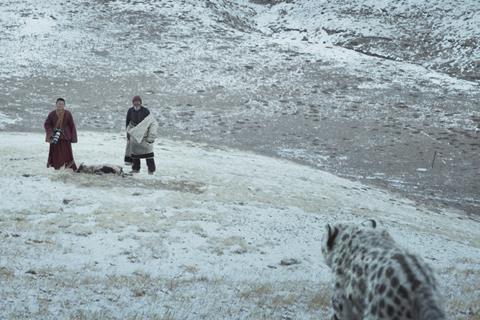
Snow Leopard by the late Tibetan director Pema Tseden has won the Grand Prix at Tokyo International Film Festival (TIFF) on a night dominated by Chinese and Iranian cinema.
The Tibetan-language drama centres on an argument between a father and son after a snow leopard breaks into a sheep pen and kills nine rams. It was completed before the filmmaker died in May and premiered out-of-competition at Venice before going on to screen at Toronto.
German filmmaker Wim Wenders, who presided over the international jury, announced the winner at the festival’s closing ceremony today. The award includes $20,000 (¥3m) prize money.
Scroll down for full list of winners
The special jury prize was awarded to political thriller Tatami by Guy Nattiv and Zar Amir, which marks the first feature to be co-directed by Iranian and Israeli filmmakers. It premiered in the Horizons strand of Venice.
Amir also won the best actress award for her role as the coach to an Iranian female judoka, who is ordered by her government to withdraw from a match to avoid facing an Israeli opponent.
Accepting both the best actress and special jury prize awards remotely from Greece, where she is filming, Amir said: “The world is on fire. Iran is on fire, murdering its finest population. Palestine is on fire, murdering thousands of civilians. Israel is on fire with people being murdered. Everywhere we look, we see innocent blood and injustice, staring helplessly at the chaos we create.
“But we made a film and this film tells a story of an impossible unity between people who were raised to hate one another. We knew already with Guy [Nattiv] that working together as an Israeli and Iranian director united for the very first time against all odds, would make history. But we didn’t know at the time that history would hurt that much when the movie came out. If cinema has a single power, may it be the one of playing with light in an age of darkness.”
Nattiv, in a video message from Los Angeles, added: “We did what our government were trying to prevent us from doing. Collaborate and become brothers and sisters so thank you for acknowledging that. We are living right now in a very difficult situation so I hope this film is a little light in this dark tunnel.”
Amir won Cannes 2022’s best actress prize for Holy Spider, and Nattiv is known for directing biopic Golda, starring Helen Mirren, and 2019 Oscar-winning short Skin.
Iran’s Yasna Mirtahmasb was named best actor for his performance in Iranian drama Roxana, in which he plays an unemployed gambler who agrees to help a woman whose car has been broken into with unexpected consequences.
Accepting the award in-person at the closing ceremony, Mirtahmasb also referenced ongoing conflicts in his speech and said: “There is no difference between Muslim, Christian, Jewish, nothing. The worst that can happen in life is war… Please stop the war.”
Chinese social drama A Long Shot, which marks the feature directorial debut of Gao Peng, won the best artistic contribution award. Japan’s Kishi Yoshiyuki won best director for (Ab)normal Desire, which also picked up the audience award. The film, based on a bestselling novel by Asai Ryo, centres on an obscure fetish for spouting water and the impact it has on the lives of two people.
Iranian drama Maria, the feature directorial debut of Mahdi Asghari Azghadi, won the Asian Future best film award.
As previously announced, Chinese filmmaker Gu Xiaogang and Indonesian director Mouly each received the honorary Kurosawa Akira Award, presented to filmmakers who have “made waves in cinema” and are expected to help guide the industry’s future.
Festival figures
The 36th edition of TIFF was fully free of pandemic restrictions, having clamped down during the Covid-19 period, and featured an expanded programme of 219 films (up from 174 in 2022).
Preliminary figures showed an 26% increase in admissions, from 59,541 last year to 74,841 this year.
Taking place from October 23 to November 1 in Tokyo’s Hibiya district of Ginza, the number of international guests rocketed from 104 last year - when the Japanese government was just beginning to relax travel restrictions - to around 2,000 this year.
The festival also notes that 22.4% of its 2019 films were directed by women.
TIFFCOM, the festival’s affiliated content market, returned in-person for the first time since 2019 and ran from October 25-27.
TIFF closes today with a screening of Godzilla Minus One, directed by sci-fi and fantasy specialist Takashi Yamazaki. It comes two days ahead of its November 3 release in Japan through Toho.
36th Tokyo International Film Festival award winners
Tokyo Grand Prix: Snow Leopard
Special Jury Prize: Tatami
Best Director: Kishi Yoshiyuki, (Ab)normal Desire
Best Actress: Zar Amir, Tatami
Best Actor: Yasna Mirtahmasb, Roxana
Best Artistic Contribution: A Long Shot
Audience Award: (Ab)normal Desire
Asian Future Best Film Award: Maria
Amazon Prime Video Take One Award: Tang Liping, Gone With The Wind
Amazon Prime Video Take One Award, Special Jury Prize: Yasumura Emi, Be Prepared
























No comments yet